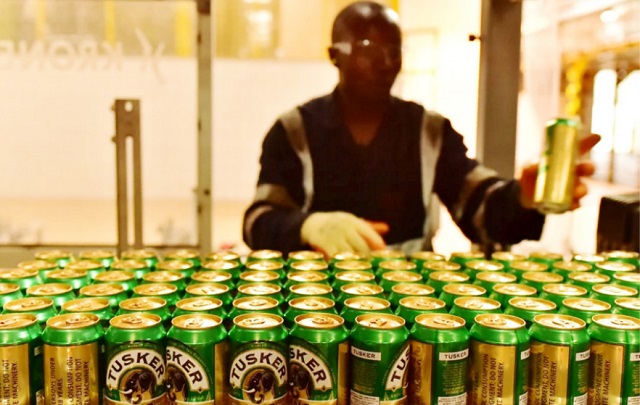
East African Breweries Ltd took a shock when Kenya closed hospitality businesses due to the pandemic
| TOM COLLINS | For any business that relies on open venues to sell goods, Covid-19 has been particularly challenging. As Kenya responded to the pandemic by closing hospitality businesses and implementing a night-time curfew, East African Breweries Limited (EABL), the largest drinks company in the region, registered a huge decline in profits.
The brewer’s net profit was down 47.4% in the second half of last year, leading to management withdrawing the interim dividend to conserve cash for the first time in history. However, the drop was an improvement on the previous six months and therefore actually represented a slight recovery.
John Musunga, managing director of Kenya Breweries Limited (KBL), EABL’s subsidiary in the local market, says the growth is due to strategic pivots by the company.
“When Covid-19 hit, with all the closures taking place, our business took a bit of shock,” he says.
“But over that period, we have been looking for opportunities for growth. We have revamped what is called ‘off trade’, that is all the sales from supermarkets, cash and carries and e-commerce. We are in a better space now than we were two years ago and hopefully if everything goes back to normal, we will have a new segment that we didn’t have in the past.”
Changing customer habits
Not only have the venues for drinking alcoholic beverages changed, but customer habits and preferences have changed too. Bottled beers like Tusker and White Cap used to be some of EABL’s best-selling products.
But cans have replaced bottles as the drink of choice for customers who prefer to buy alcoholic drinks that they can transport either for weekend trips, to drink in parks or to friends’ houses. Spirits have also gained popularity for the same reason.
EABL, which is majority-owned by UK-based Diageo, one of the world’s largest alcoholic drinks manufacturers, produces well-known spirits like Johnnie Walker as well as local creations like Kenya Cane. The line of drinks most impacted was the lower-end Senator Keg brand, which is sold exclusively in bars and dropped 29% last year.
“Initially bars were closed for two or three months and that’s the only place where you can access that product, so it really took a hit,” says Musunga.
Value products were also impacted as job losses in the informal sector were widespread during the beginning of the pandemic. While office workers were largely able to continue working remotely, Kenyans in the informal sector struggled to work during initial lockdowns, leading to a loss of purchasing power.
Coronavirus regulations also led to a slowdown in Kenyan manufacturing and processing as industries had to get up to speed with ensuring employees observed social distancing and were protected from the virus.
But Musunga says that there is a big difference in how EABL is able to cope with the pandemic between the “first wave” and the current “third wave”.
“We have found a way to continue manufacturing, found ways to work with additional distribution partners to make sure those products are available in the outlets for the limited times that they are available according to the regulations,” he says.
Overall, net sales in Kenya, which account for 66% of the total group sales, dropped by 10% last year. However, sales in Uganda and Tanzania rose by 13% and 17% respectively as lockdowns in both countries were less severe in comparison to Kenya.
Moving forward
Though the company looked to tighten its belt during the first wave of the pandemic by reducing capex investments and managing costs, EABL is now looking to start reinvesting in the business, Musunga says.
A recent study by the brewer found that 78% of customers who have used EABL home delivery services will continue using them in the future.
“This tells you that the consumer is more comfortable in the confines of their homes, unlike in the past when they wanted to go out and spend,” says Musunga.
KBL launched an e-commerce platform called Party Central to secure sales over lockdown and the managing director says that the business will continue to invest in such “omnichannels” moving forward.
The brewer is also likely to start introducing a raft of new products to continue to tap into Kenya’s changing and developing taste buds. Around a decade ago, lager and Guinness were pretty much the only beer-type drinks that could be bought in Kenya.
However, the global micro-brewery revolution has pushed consumer choices towards a wider variety of hop-based beverages. Just before the start of the pandemic EABL introduced Tusker Cider, Tusker Ale and Guinness Hop House.
“It’s a mixed bag for sure, our ciders have done super well as we introduced it well before the pandemic,” he says. “But our Tusker Ale and Guinness Hop House, these were new brands at the beginning of Covid-19 so we were not able to power through with them as much as we would have liked to in terms of marketing.”
The products were also partly a response to a growing sub-culture of independent brewers that are introducing IPAs and stouts to the Kenyan marketplace. Though EABL is by far the largest brewer in the region, to keep market share it must stay relevant to a younger generation with an ever-increasing globalised outlook.
“If you are not innovating in this category then you will die a slow and natural death,” says Musunga.
Rebound reliant
Ultimately, EABL’s rebound is pegged to Kenya’s economy and the changing Covid-19 restrictions. However, the outlook for Kenya in terms of coronavirus does not look good.
Uganda, however, had just plunged into a second lockdown for 42 straight days as coronavirus cases surged.
“If you ask me our first priority as a government and people is to ensure that vaccination takes root because that is the basis for reopening the economy,” says Musunga.
****
Source: Adapted from African Business Magazine
 The Independent Uganda: You get the Truth we Pay the Price
The Independent Uganda: You get the Truth we Pay the Price



